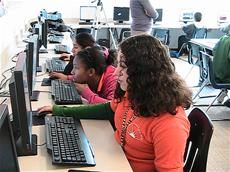Microsoft in Education Global Forum, Dubai, 2...
0 comments
 6
6 
MOOCs are at the cutting edge of new education… right?
Not quite. No doubt about it, online learning is the education experiment du jour. Investors and media organizations are elbowing their way into the ed tech market, and academic entrepreneurs want to provide free education opportunities for the poor. But it seems to me that some recent online learning models, like MOOCs -- which at the outset appear exciting and promising -- overlook what we know about what constitutes effective education: learning-by-doing. Programs such as edX may give learners 24-hour access to classes, but they employ rather traditional instructional methods. In harnessing the potential of online learning, why not move beyond streaming filmed teacher-led lessons aimed at mass audiences? Years of research have proven that education is more effective – regardless of whether it's being carried out in print, on TV, through PCs, online, or mobile apps – when it involves students learning by working alone or in teams to solve a problem or create a simulation that explains a piece of knowledge. This type of learning exercise deepens learning more than passive consumption of instructional tutorials or reading textbooks. And online learning—with features like social networks and virtual resources—can enable such constructive, collaborative workspaces and self-paced digital curricula that empower students to take ownership of their learning. There is potential for teachers to use technology in creative ways that not only address instruction, but also shift learning to a more personalized and productive experience. Before educators invest in online learning, it’s important to pause and remember what’s been proven to foster effective learning. Combining the potential for better access to instruction with more opportunities for collaborative, creative hands-on learning, online education can yield an exciting model in which learners obtain basic knowledge and become architects of their own learning.
Bio Dr. Idit Harel Caperton (Ed.M. Harvard, Ph.D. MIT Media Lab) is a pioneer of new-media technology for creative learning, innovation, and globalization. As founder of the World Wide Workshop, she pursues her passion of building visionary global learning systems to transport MIT Media Lab-style education to millions of youth worldwide. In 2006 the Workshop launched Globaloria, a blended-learning platform employing social networking and game mechanics to teach computing and game media literacy. Her work has been recognized with numerous awards, including the AERA Outstanding Book Award, Computerworld-Smithsonian Award, and most recently, the Jessie McCanse Award for Individual Contribution to Media Literacy.